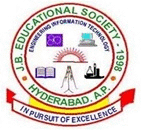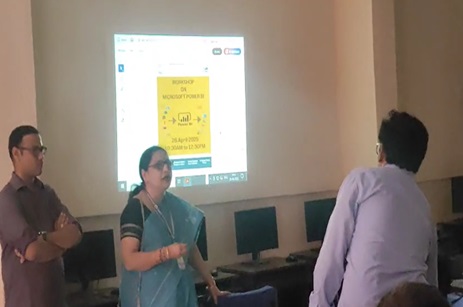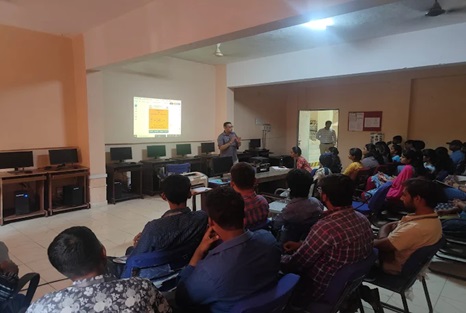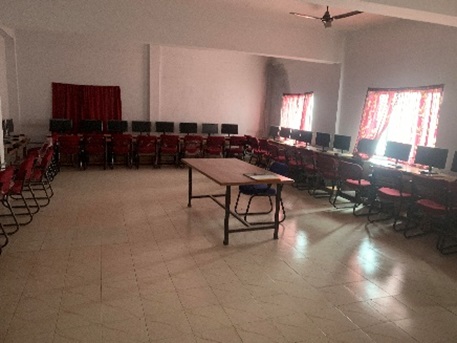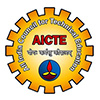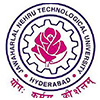Department Details
The Department was established in the year 2021 and the intake is 60 students Artificial Intelligence (AI) is a computing concept that enables a machine to think and solve complex problems as we humans do with our natural intelligence. AI is the next phase of the industrial revolution and has established itself firmly in our society. Almost all branches of industry have been affected by the ongoing transformation through its algorithms.
Data Science (DS), often recognized as the fourth paradigm of science—following empirical, theoretical, and computational approaches—has become pivotal in the era of digital transformation. In today’s data-driven world, data is aptly referred to as the “currency” or “fuel” of our time, powering innovation across industries. It plays a transformative role in reshaping businesses, driving societal change, and influencing the future in profound and positive ways.
Artificial Intelligence (AI) and Data Science (DS) have unlocked vast opportunities for interdisciplinary collaboration across computer science, mathematics, statistics, domain sciences, and information technology. With advances in technologies such as machine learning, deep learning, natural language processing, computer vision, and cloud-based analytics, the demand for skilled professionals continues to grow globally. These technologies rely on practical skills like Python programming, data pre-processing, model building using TensorFlow and PyTorch, big data processing with Spark, and deploying AI models using Docker and cloud platforms like AWS or Azure—making AI and DS one of the most sought-after career paths today.
The B.Tech (Artificial Intelligence and Data Science) program is designed to meet these modern demands by equipping students with comprehensive knowledge and hands-on skills essential for developing and deploying AI-driven solutions. Students will be trained in data handling (using tools like Pandas and SQL), machine learning algorithms, deep learning architectures, natural language processing, data visualization with Matplotlib and Power BI, and MLOps practices. The curriculum also emphasizes real-world applications, model deployment via APIs (Flask/FastAPI), and version control using Git, ensuring graduates are industry-ready and capable of building scalable, intelligent software systems—foundational competencies that are crucial in today’s AI-centric innovation landscape.
HOD-Profile

Mrs.Kavitha Mykal
Mrs.Kavitha Mykal Assistant Professor and Head of Department of AI &DS. She has completed her B.Tech from VTU Belgavi, Karanataka in the year 2012. She has got her M.Tech in Computer Science and Engineering from University of Mysore, Mysore in 2014, Currently pursuing Ph.d in VTU, Belgavi, Karanataka. She total 6+ Years of Teaching Experience. She has attended FDPs and technical workshops, NPTEL Swayam MOOCS courses from IIT Bombay, AICTE, and FDPs of various fields till date. She maintains the department with utmost diligence in all the activities and support to the faculty.
Vision & Mission
Vision
To impart quality education for moulding students as competent professionals with knowledge of evolving technologies to meet the demands of industry and society.
Mission
To impart high Quality Technical & Professional education in order to mould the learners into globally competitive professionals who are professionally deft, intellectually adept and socially responsible. The Department of Artificial Intelligence and Data Science strives to make the learners inculcate and imbibe pragmatic perception and pro-active nature, so as to enable them to acquire a vision for exploration and an insight for advanced inquire.
Short/Long term Goals
Short term Goals
To conduct faculty development programs regularly for skill up-gradation.
To modernize all the laboratories.
To train and educate students as Global Citizens.
To Place teaching / tutorial material of each subject on the internet to enable students to browse at their own place of learning.
To encourage the students to participate in community development programs.
To conduct summer and winter schools for faculty members and short-term course for technicians to widen their knowledge base and deepen their understanding of the latest trends and developments in field of Artificial Intelligence and Data Science.
Long term Goals
To be among top ten leading institutes in India and abroad and be recognized as the best department in terms of research and innovation.
To develop young professional graduates with strong foundational and practical knowledge in Artificial Intelligence and Data Science.
To provide high-quality technical and professional education in the field of Artificial Intelligence and Data Science that fosters creativity, analytical thinking, and interdisciplinary learning.
To establish and strengthen Industry-Institute interaction and be industry solution providers.
To cultivate a learning environment that encourages research, innovation, and continuous skill enhancement in emerging AI and DS technologies.
To promote a proactive and pragmatic mindset among learners, enabling them to explore, innovate, and lead advancements in artificial intelligence and data-centric technologies.
Professional Bodies & Voluntary Organization
NSS Activities: Conducted Blood camp at our college and donated books and stationary for the school children in nearby Moinabad villages.
Infrastructure
The department owns 250 latest computer systems with high configuration and upgraded software and maintains an exclusive lab with 1 to 1 ratio for each subject.
DETAILS OF LABORATARIES
The following are the laboratories with the state of the art equipment’s
|
S.no
|
Lab Name
|
|
1
|
Operating System Lab
|
|
2
|
Computer Networks and Web Technologies Lab
|
|
3
|
Compiler Design Lab
|
|
4
|
Machine Learning Lab
|
|
5
|
Mobile Application Development Lab
|
|
6
|
Network Programming Lab
|
|
7
|
Scripting Languages Lab
|
|
8
|
Android Application Development
|
|
9
|
Internet of Things
|
|
10
|
Linux Programming Lab
|
|
11
|
Python Programming Lab
|
|
12
|
R Programming Lab
|
|
13
|
Software Engineering Lab
|
|
14
|
Concurrent Programming Lab
|
|
15
|
Software Testing Methodologies Lab
|
|
16
|
Data Mining Lab
|
|
17
|
C++ Programming Lab
|
|
18
|
Data Structures Lab
|
|
19
|
Database Management Systems Lab
|
|
20
|
Java Programming Lab
|
|
21
|
IT Workshop Lab
|
The Department has excellent Departmental Library facility under Artificial Intelligence and Data Science.
STANDARD OPERATING PROCEDURE (SOP) FOR LAB IN-CHARGES
Research and Development
PAPER PUBLICATION
Mrs. Kavitha Mykal published a paper on “Query Image Based Retrieval and Classification System” in IEEE International Conference Research Journal, ISSN 0925, Volume-08, May 2017.
Mr. Mohan Kamal Hassan published a paper on “Sentimental Analytics on E-commerce Product Review using Hybrid Machine Learning Algorithm” in Journal of IOP Research Science, ISN 9FG38, Volume-60, July-2018
Mr. Mohammed Zuber published a paper on “ An Empirical Study on Privacy Preserving Data Mining.” in http://www.ijettjournal.org, Volume 3 Issue 6-2012, ISSN: 2231-5381.
Mr. Mohammed Zuber published a paper on “ Automatic Detection of Name And Aliases From The Web.” in http://www.ijera.com/papers/Vol3_issue6/JS3616841689.pdf, Issue 6, Volume 3, ISSN: 2248-9622.
Mrs. Sherin published paper on “Use of ANN to identify fake profiles”
Seminars
Seminars/Workshops Organised
Conducted a guest lecture on “Space Development” in the month of Feb 2025.
Conducted one-day workshop on “Microsoft Power BI” in the month of May 2025.
Conducted two days workshop on “Microsoft SQL” in the month of Mar 2025.
A guest lecture on Decoding Large Language Models is organized on 03/03/2025.
Seminars/Workshops Attended
Mrs. M. Kavitha attended Faculty Development program on ICT Education Online at IIT Bombay.
Mohan Kamal Hassan attended “Business Analytics with Data Engineering Technologies Programme on Microsoft Power BI, Alteryx Designer at VIT University.
Mr. MD Zuber Attended workshop on “New Trends in Web Technologies”, Conducted by the University of Udine, Udine, Italy in JNTUH Campus.
Mr. MD Zuber attended workshop on “Cisco Education day event.” Conducted by the Cisco Networking Academy.
Mrs. Sherin attended a workshop on Inno prime technologies conducted on web designing and salesforce at JNTU University.
Achievements
FACULTY ACHIEVEMENTS
-
Mrs. M. Kavitha presented seminar on “Recommender system using Data Mining”. in GITAM, Vizag, September 2023.
-
Mr. Mohan Kamal Hassan presented seminar and conference on “Light Fidelity technologies at JNTUH and published paper on Sentimental Analytics of Text based Reviews from VIT University, Volume 6, Issue 8 July 2018.
-
Mr. MD Zuber presented multiple seminar’s on “ Data Analytics” in INFOSYS, Bangalore, 2022.
-
Mrs.Sherin received AOM award as a most valuable performer for doing quality check(QC) @cyient company.
STUDENT ACHIEVEMENTS
-
80+ students have participated in various technical eveny at Vigyan Vaibhav 2025.
-
Won 2nd prize in inter department men’s cricket conducted in college sports event 2025.
-
Won 2nd prize in inter department women’s kabadi conducted in college sports event 2025.
-
Won 2nd prize in inter department women’s throw ball conducted in college sports event 2025.
Best Projects
1. Network Application Login Framework Data Management System
The main aim of this project is to develop a secure, centralized network application login framework integrated with a data management system. This system is designed to streamline user authentication and facilitate structured data handling across different modules of an organization. The web-based application offers a robust framework for managing user access and storing sensitive information in a protected environment, ensuring secure and efficient data operations over a network.
The system features a login authentication module, allowing access based on predefined user roles such as administrators, staff, or general users. The core of the application is a relational database that stores user credentials, activity logs, and additional application-specific data.
Key functions of the system include secure login, role-based access control, session tracking, and audit logging. Secondary functionalities include data backup and recovery, report generation, and monitoring access history for system integrity. The application can be accessed via standard web browsers, making it a flexible and scalable solution for organizations that require centralized user management and secure data handling.
This project was successfully completed by the Final Year students of the Academic Year 2018-19, showcasing a practical implementation of secure web application frameworks combined with efficient data management practices over networked systems.
2. Sentimental Analytics on Hybrid Data Science Algorithm.
This project focuses on building a sentiment analysis system that applies hybrid data science algorithms to analyze customer product reviews and classify sentiments as positive, negative, or neutral. The goal is to provide businesses with actionable insights by processing and interpreting user-generated content, enabling them to make informed decisions regarding product improvements and customer satisfaction.
The application is implemented as a web-based interface that allows users to upload or enter product reviews. It provides an intuitive platform for viewing analytics, managing data, and generating sentiment-based insights. As the digital landscape grows, analyzing customer feedback through automated systems has become essential, replacing traditional manual review processing methods. This web-based solution significantly enhances processing speed, efficiency, and accuracy.
The core functionality of the system involves data ingestion, preprocessing, sentiment classification using machine learning and natural language processing (NLP) techniques, and visualization of the results. The system inputs consist of product review texts, while the output is a sentiment classification along with confidence scores. Access to the system is controlled through user authentication, and only authorized users (e.g., admin or analysts) can upload, view, or manage the data and models.
This project was successfully completed by the Final Year students of the Academic Year 2016-18, demonstrating a practical application of AI and Data Science techniques in sentiment analytics for real-world business scenarios.
3. Enhanced Smartwatch User Authentication using Dual Mode Behavioural Biometric Analysis
This project aims to develop a robust and intelligent user authentication system for smartwatches using dual-mode behavioural biometric analysis. As wearable technology becomes more integrated into daily life, ensuring secure and seamless access to devices has become critical. Traditional authentication methods like PINs and patterns are often inconvenient or vulnerable. To address this, the project introduces an enhanced security framework that leverages continuous and unobtrusive biometric data for real-time user verification.
The proposed system utilizes two behavioural biometric modalities—gait recognition and touch dynamics—captured via the smartwatch's onboard sensors such as accelerometers, gyroscopes, and touchscreen interfaces. These data streams are analyzed using machine learning algorithms to identify and authenticate users based on their unique physical and interaction patterns.
The system architecture includes data acquisition, preprocessing, feature extraction, model training, and real-time authentication. Advanced classification techniques such as Random Forest, SVM, and deep learning models are used to build high-performance user profiles.
This project was successfully completed by the Final Year students of the Academic Year 2018-19, demonstrating the integration of biometric security, wearable computing, and AI-driven pattern recognition to create a future-ready user authentication solution for smart device.
